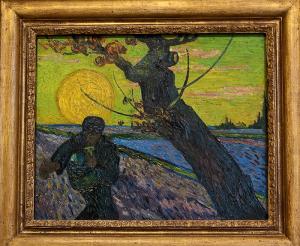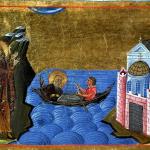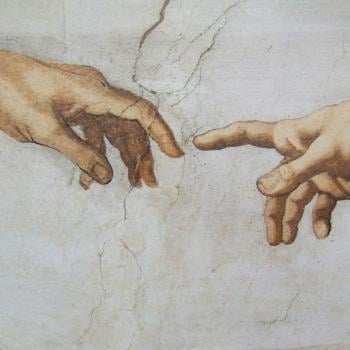 Jesus was and is king, king of all creation, though as he himself indicated, his kingdom is not to be found in the way people look for any other kingdom on earth, where it exists within a particular locality with actual boundaries. Rather, the kingdom of God is all around us, within us, in our midst, penetrating all things and yet transcending them all, for it has no limit:
Jesus was and is king, king of all creation, though as he himself indicated, his kingdom is not to be found in the way people look for any other kingdom on earth, where it exists within a particular locality with actual boundaries. Rather, the kingdom of God is all around us, within us, in our midst, penetrating all things and yet transcending them all, for it has no limit:
Being asked by the Pharisees when the kingdom of God was coming, he answered them, “The kingdom of God is not coming with signs to be observed; nor will they say, `Lo, here it is!’ or `There!’ for behold, the kingdom of God is in the midst of you” (Lk. 17:20-21 RSV).
In himself, Jesus reveals the kingdom of God; he manifests its presence to all. Even those who are spiritually blind, having eyes which cannot yet see into the kingdom can look at and encounter Jesus, or his image, and see a manifestation of the kingdom God right before them.
The kingdom of God is all around is; wherever we shall go, the kingdom of God is there. It does not put on a show; rarely does it reveal itself in great acts of power and might. It comes as it is, in the humble truth of reality. It is all around us, and we are in it even as it is already in us. Sadly, most of us do not perceive it as it is in its pure glory due to the veil which we have put on between it and us. “To the pure all things are pure, but to the corrupt and unbelieving nothing is pure; their very minds and consciences are corrupted” (Titus 1:15 RSV). Most of us see the world around us, not under the light of the kingdom of God, but in the darkness of sin; all things are covered and mired for us, defiled by our own intentions and state of being; all things appear corrupted because we are corrupted. Thus, though all things are in and of the kingdom of God, we do not recognize the kingdom of God in them.
Creation is good, and made good, and so creatures are not said to be either clean or unclean by their nature; when they exist as they are meant to be they are empty of defilement and even of the possibility of defilement, for such defilement is not in them but in us, as St. John Chrysostom recognized: “Things then are not clean or unclean from their own nature, but from the disposition of him who partakes of them.”[1] We have cast ourselves outside of the kingdom of God, outside of paradise. We find ourselves separated by the kingdom through our defilement, by our sin, the barrier which we put up between us and God. Through it, we find ourselves stuck in our own private hell. For the world reflects our disposition and activity back upon ourselves. Thus, hell should be understood as a state of being, not a place; it is the kingdom of God without mercy and grace, without purity and goodness, because we have removed such grace from ourselves.
If we open up to God through faith, hope and love, allowing God to work in and with us, he will remove the veil of sin which we have created and the kingdom will be revealed in its majesty. The seed of faith, implanted in our mind by God, will slowly grow in us, purifying our mind, helping it to use the spiritual senses which have been hindered by sin, so that as it grows in us, our experience of the kingdom of God will also grow. If we cooperate with God’s grace, we will be watering that seed, giving it the soil it needs to grow, to take over and cleanse our mind of all the remnants of sin, and we will see and encounter the kingdom of God in all things, as all things will be seen in the purity of a grace-filled mind.
Slowly we will come to realize that the seed which God implanted in our mind is the seed of the kingdom of God, the mustard seed which will grow and multiply in us if we give it fertile soil, so where that seed is, where that purity has been established, we can get a glimpse and experience of the kingdom of heaven for it is the kingdom of heaven in us and with us, as St. Ambrose once intuited:
Therefore, if the Kingdom of Heaven is a grain of mustard seed and faith is a grain of mustard seed, surely faith is the Kingdom of Heaven and the Kingdom of Heaven is faith. Therefore, he who has faith has the Kingdom of Heaven, and the Kingdom of Heaven is among us, and faith us among us, for we read: “The Kingdom of Heaven is within you” [Saint Luke 17:21]; and in another place, “Have faith in yourselves” [Saint Mark 11:12]. [2]
Now, it would seem that Ambrose is relating two things together in a fallacious form of association. More would need to be said to show how and why Ambrose is correct in making this association, if we wanted to examine what he said logically; but if we are speaking of the spiritual intuition of the saints, we must recognize such saints often show and demonstrate truths which transcend the logic of the words they write, and if we ponder what they say, we can discern the reason for their words even if they do not offer the reason themselves. Thus, while Ambrose might not make the argument for us, we can discern what he is saying and realize what he said is valid. The seed of faith is the kingdom of God, and not other than the kingdom, because wherever God is, there is the kingdom of God. It is because the kingdom of God is within us we see that God, the sower of the seed, is sowing himself within us through his grace. The sower has sowed the seeds of the kingdom of God in all, for all things partake of and come from the kingdom of God. Whether we strangle the seed or not through our intentions will determine what happens as a result of that seed; will we let it grow until we let ourselves become pure and see all things in the light of grace, in the light of the kingdom of God, beautiful and pure and without defilement, or will we strangle it with our intentions, defile and corrupt ourselves, making the soil poor and the seed wither and die, leaving us only with the barren rock of our own defiled habits?
This is what lies before us. The kingdom of God is within us. It is deposited in us, in our mind, waiting for us to act. We can see the kingdom of God if we let our faith grow and purify us in that growth; the more we strive for the good, the more we strive for charity and justice, the more we water the seed and let it grow, the more we will be able to see and know the world in the light of the kingdom. It is this seed which allows us to let our defiled self, our notion of who and what we are apart from the kingdom of God, die; once we have truly died to such impurity, and let the kingdom of God transform our whole being, we will be welcomed by the Lord in our death to paradise, and we will truly know the kingdom of God which has no end.
[Image=The Sower by Vincent van Gogh [CC BY-SA 2.0 (https://creativecommons.org/licenses/by-sa/2.0)], via Wikimedia Commons]
[1] St. John Chrysostom, “Homilies on Titus” in NPNF1(13): 529.
[2] St. Ambrose, Exposition of the Holy Gospel According to Saint Luke. trans. Theodosia Tomkinson (Etna, CA: Center for Traditionalist Orthodox Studies, 2003), 308. The translation for the text from Mark seems off – it seems to be from Mark 10:22, where it says “in God.” But Ambrose could have been using a different text, or remembering a text which the translator thought was from Mark. Either way it is best to read it as “faith inside yourselves” and not as “faith in yourself” as if we trust ourselves, so not to read the text as suggesting self-theosis.
Stay in touch! Like A Little Bit of Nothing on Facebook













